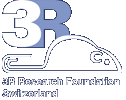 |
de | fr | en print view![]()
3R-Project 57-97
Laboratory animal husbandry and welfare - Key strategic goals of future research
Hanno Würbel 1
Institute of Animal Sciences, Physiology and Animal Husbandry, ETH Zurich, 8603 Schwerzenbach, Switzerland
1present address:
Institut für Veterinär-Physiologie, Justus-Liebig-Universität Giessen, 35392 Giessen, Germany
hanno.wuerbel@inw.agrl.ethz.ch
Keywords: ethology: laboratory animals
Duration: 1 year Project Completion: 1997
Background and Aim
In 1995, the German Foundation for the Promotion of Research on Replacement and Complemen-tary Methods to Reduce Animal Testing (set), sent out a questionaire to laboratory animal scientists to assess (1) whether scientific evidence suggested that standard husbandry practice would interfere with the welfare of laboratory animals, (2) whether independent evidence suggested that impaired welfare would interfere with the validity of animal research and (3) whether there were alternatives in sight to current standard housing conditions. The highly diverse and sometimes contradictory responses raised concern as to the future allocation of research money in the area of laboratory animal welfare.
Therefore, the 3R Research Foundation Switzerland together with set decided to support an inter-national workshop where leading scientists from different research groups could discuss key strategic goals of future research on laboratory animal husbandry and welfare.
Method and Results
In 1997 this workshop was organized by the Center for Laboratory Animal Husbandry and Welfare (KLab) at the Institute of Animal Sciences, ETH Zürich. Participants were scientists, representatives of the two funding bodies, and legal authorities from the Swiss Federal Veterinary Office.
Participants agreed on the following priorities for future research: behavioural ecology of labora-tory animal species, mechanisms underlying behaviour, cognition, inter-individual differences, non-invasive indicators of impaired welfare, and husbandry effects on experimental results. Multidisciplinary and interdisciplinary approaches should be pursued to use present knowledge most effectively. However, it was also agreed that a framework was needed to facilitate research into how animals‘ behaviour in their natural habitat predicts their environmental needs, and how these needs are expressed as both suffering and pathologic changes when they are not met by the environment. As a result of a follow-up meeting with leading ethologists in 1998 (again organized and chaired by the KLab), a research strategy is currently being developed with the goal of identifying reliable behavioural indicators of impaired welfare. It is planned to publish the framework of this strategy as soon as possible.
Conclusions and Relevance for 3R
The relationships between suffering and pathology need to be understood from an evolutionary point of view. It is proposed that natural selection favours the conscious emotional experience of threats to survival and/or reproduction (e.g. pathological changes), if, and only if, such experi-ences are instrumental in avoiding fitness costs by means of behavioural changes. This view implies on the one hand that conditions leading to pathological changes do not necessarily induce suffering. On the other hand, suffering may occur under conditions that do not induce pathological changes. Thus, whereas some pathological changes may be irrelevant with respect to animal welfare, the mere absence of pathological changes does not guarantee good welfare. In consequence, behavioural changes associated with threats to fitness (e.g. avoidance behaviour) and behavioural signs that the animals´ attempts to adjust their behaviour have been stymied (e.g. stereotypies) represent the most direct indicators of suffering induced by inappropriate husbandry conditions.
| Last modified 2018/10/12 |